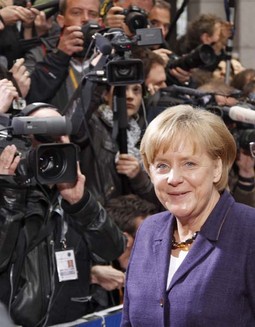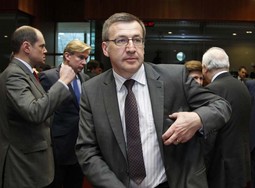Published in Nacional number 763, 2010-06-29
EUROPE HALTS SERBIA
Merkel: EU will accept Croatia and no one else
GERMAN CHANCELLOR Angela Merkel has greatly disappointed the Serbian leaders by convincing other EU members that the Union should end its expansion to the east after Croatia's accession
 FIRM DECISION Angela Merkel decided back in March 2009 that the EU should not take in any more members after Croatia, and she has proven to stand strong in that decision to this dayGerman Chancellor Angela Merkel has put forth a resolute stance in the European Union on the issue of EU enlargement: Croatia will be accepted, and no one else after it. All countries inspiring to membership have discretely been informed of this stance through diplomatic channels. This decision has aroused panic in the Serbian political circles, as it counters the policies recently enforced by President Boris Tadic, together with Foreign Minister Vuk Jeremic and Government Vice-president Bozidar Djelic, in which they have falsely convinced the Serbian public that Serbia will enter into the EU in record time.
FIRM DECISION Angela Merkel decided back in March 2009 that the EU should not take in any more members after Croatia, and she has proven to stand strong in that decision to this dayGerman Chancellor Angela Merkel has put forth a resolute stance in the European Union on the issue of EU enlargement: Croatia will be accepted, and no one else after it. All countries inspiring to membership have discretely been informed of this stance through diplomatic channels. This decision has aroused panic in the Serbian political circles, as it counters the policies recently enforced by President Boris Tadic, together with Foreign Minister Vuk Jeremic and Government Vice-president Bozidar Djelic, in which they have falsely convinced the Serbian public that Serbia will enter into the EU in record time.
COREPER Last Friday, the Council of Europe decided that Croatia would be permitted to open the final three negotiation chapters for EU accession, but the leading institutions of the Union refused to discuss Serbia's request to apply for membership. The general assessment is that this decision by the COREPER body has opened the final door for Croatia, and it is up to Croatia to negotiation on the remaining outstanding chapters in the coming months, if possible by year's end, so as to sign the final agreement in spring 2011 and determine the date of accession. Croatia may still face some difficulties in closing several chapters, especially the one on the judicial system, and some very difficult measures will be expected to be taken in this area. The COREPER decision on Croatia can be interpreted only as an expression of the interests of the EU Member States to finally take the excessively long Croatian negotiations off the agenda, not only for Croatia's sake, but also for the EU itself.
BY CLOSING CHAPTERS with Croatia and accepting it into membership, the European Union will complete a very important period in its history: the enlargement process that has been ongoing for some 15 years. In 2004, ten new member states entered into the EU, with another two in 2008, and this period should be ended with Croatia's entry, likely in 2012. Croatia will be the final country to enter into the EU and there will be no further enlargements, at least for the next decade. This will not be because countries aspiring to membership, such as the countries of the former Yugoslavia and Albania, will not be ready, but instead because the European Union has made a firm decision to not accept any new members. And this decision was made at the initiative of Europe's most influential politician, Angela Merkel.
ANGELA MERKEL MADE THIS DECISION in March 2009, but only now it is evident that she plans to strictly enforce it. At that time, it was still not clear just how firm she stood on this issue. When she spoke at a meeting of her party, the CDU on 17 March 2009, she touched on the issue of enlargement, saying "The European Union has to consolidate before it continues its enlargement." At that time, she explicitly mentioned that Croatia would be permitted into the Union, and then there would be a pause. "This is not what we would like, but no one in Europe will benefit it the Union is not in a state to integrate new members, and if the enlargement process happens too quickly. For that reason, at this time, we see only Croatia and its accession negotiations before us. After that, our first task needs to be to see how the Lisbon Agenda will function, and to give it some time to consolidate with regard to the issue of integration," she said. Several days after giving that speech, the CDU announced its party programme for the upcoming elections for European Parliament, which stated, "Enlargement from 15 to 27 Member States in only a matter of days demanded great efforts. Therefore, the CDU now prefers a period in which the consolidation of values and institutions of the European Union must take priority over enlargement. The only exception to this will be Croatia."
ON THE PARTY'S WEBSITE at that time, an interview with Angela Merkel on the topic of enlargement was posted. She made special reference to the Western Balkans, saying, "We know that stability, regardless of whether this concerns Serbia, Kosovo, Montenegro or other countries, can only be guarantees if those countries have the perspectives of entry into the EU, and they will have to wait on that for some years."
 END OF SERBIA'S EU DREAM Serbian President Boris Tadic has convinced the public that Serbia will enter into the EU in 2014, exactly 100 years after World War I started because of SerbiaPROOF THAT THIS HAS BECOME THE OFFICIAL policy of Germany, and through Germany of the European Union, was seen in the days that followed. In December 2008, Montenegro submitted its application to become a candidate for accession. In March 2009, that application came before the EU Member State representatives. Earlier, the Member States typically forwarded such things to the European Commission for further procedure without much debate. But this time, at Germany's initiative, which was supported by Belgium and The Netherlands, the Member States refused to forward the application to the Commission, thus blocking the Montenegrin application indefinitely. This was a sign that Angela Merkel's new policies had come into effect. Montenegro has still not received candidate status, nor has Albania, which submitted its application for members in April 2009. Serbia is also still waiting on candidate status after submitting its application for membership in December 2009. The only other country holding candidate status is Macedonia, though the start of negotiations have been halted and no further decisions made.
END OF SERBIA'S EU DREAM Serbian President Boris Tadic has convinced the public that Serbia will enter into the EU in 2014, exactly 100 years after World War I started because of SerbiaPROOF THAT THIS HAS BECOME THE OFFICIAL policy of Germany, and through Germany of the European Union, was seen in the days that followed. In December 2008, Montenegro submitted its application to become a candidate for accession. In March 2009, that application came before the EU Member State representatives. Earlier, the Member States typically forwarded such things to the European Commission for further procedure without much debate. But this time, at Germany's initiative, which was supported by Belgium and The Netherlands, the Member States refused to forward the application to the Commission, thus blocking the Montenegrin application indefinitely. This was a sign that Angela Merkel's new policies had come into effect. Montenegro has still not received candidate status, nor has Albania, which submitted its application for members in April 2009. Serbia is also still waiting on candidate status after submitting its application for membership in December 2009. The only other country holding candidate status is Macedonia, though the start of negotiations have been halted and no further decisions made.
AT THAT TIME, this turnabout in German policy was not given much attention, and many political analysts thought that this was just a tactical and temporary step out of internal policy reasons, as Germany was facing elections for the European Parliament and some important local elections. It was believed that after those elections, Germany would again, as it did before, support enlargement, as it had been the strongest support of all the European countries until that time. Some said that Germany would face strong pressures by the countries that had advocated further enlargement, such as Great Britain, whose foreign minister David Miliband had made it clear that he did not agree with Merkel, stating that enlargement should continue. Some felt that this was important, not only for the purpose of stabilising the situation in the former Yugoslavia, but mention was also made of other countries in the Union's neighbourhood, such as the Ukraine and Moldova.
MERKEL'S POSITION, however, was unshakable. In the months that followed, nothing important changed in Germany's position, even though the ruling party in Serbia became to strongly aspire towards EU membership. President Tadic began to forcefully lobby with certain countries that had given Serbia their support, primarily Italy and Greece, and later Spain and Romania. At the end of December 2009, Tadic submitted Serbia's official application for EU membership to the Swedish premier in Stockholm. The Serbian politicians and media began to spread optimism that Serbia would be able to rapidly enter the EU, and the public were promised that the EU would accept Serbia's application for candidacy in March, that the accession negotiations would begin by the end of 2010 and that Serbia could become a member in 2014. This would be a symbolic date, as the 100th anniversary of the start of World War I, which started because of Serbia. Some Serbian newspapers even claimed that Serbia and Croatia could enter into the EU together, which would also have symbolic importance. However, Serbia was quick to sober up. The European Union has still not accepted Serbia's application for candidacy and, as things now stand, it will not even be considered until the end of the year.
In interviews for the Serbian press, foreign diplomats have begun to hint that Serbia's path to the EU will not unfold at a rapid pace, as some Serbian politicians have announced, and will certainly not be possible until Serbia resolves some key problems. Mention has been made of the extradition of war criminals Ratko Mladic and Goran Hadzic to the Hague Tribunal, the informal recognition of the independence of Kosovo, and several other tasks, such as a more energetic battle against corruption and organised crime, a deep restructuring of the economy that is still largely state owned, and a raising of the level of the Serbian economy. A recent analysis of the gross domestic product of European countries in comparison with the average GDP of the European Union showed that Serbia's GDP is only 37% of the EU average, Montenegro 43%, Bosnia and Herzegovina 30% and Albania 27%. In comparison, Croatia's GDP is 64% of the European average.
THE FACT THAT SERBIA'S candidacy for EU membership has not moved forward at all for some time, and that European diplomats have warned Serbia not to hope for a rapid entry in the EU and that this process could take decades, has become a serious bother to Serbia's political leadership. They have obviously been informed through diplomatic channels that the doors to the Union are closing after Croatia's accession. Allegedly, this message was most emphatically passed on by the German diplomats. This stimulated Tadic to give a dramatic speech in Istanbul several days ago, at the Summit of the countries participating in the Southeast European Cooperation Process. Tadic requested that the European Union give its precise stance on the issue of future enlargement, "I support the full membership of all the countries in this part of Europe. Only as a whole can Southeast Europe be fully integrated into the EU, only then can the promise of peace given after the Cold War be fulfilled. I will be very direct. The European Union has to say whether they want us in the European Union, and whether it is ready to work with us in order for us to fulfil the commitments we have taken on. Europe needs to give us an honest answer, without excuses. We all have our barriers, but we are facing them. We shall not permit these to be an excuse for doing nothing."
 WEAK RESPONSE FROM BRUSSELS Belgian Foreign Minister Steven Vanackere was unable to give Serbia any guarantees or timeframe that EU enlargement would again continue one dayTadic did not receive a response to his appeal, at least not a real one. The only thing that could be somewhat considered a response came last Friday from the Foreign Ministry of Belgium, the country set to take over the EU presidency from Spain as of 1 July.
WEAK RESPONSE FROM BRUSSELS Belgian Foreign Minister Steven Vanackere was unable to give Serbia any guarantees or timeframe that EU enlargement would again continue one dayTadic did not receive a response to his appeal, at least not a real one. The only thing that could be somewhat considered a response came last Friday from the Foreign Ministry of Belgium, the country set to take over the EU presidency from Spain as of 1 July.
"The EU is ready to continue the process of enlargement. All the countries of the Western Balkans have their future in the EU, however the answer to the question of timing will be given based on the true progress those countries make," was the statement. In other words, there are no guarantees that enlargement will continue, there is no EU position on enlargement, and there is no timing. There is just an undefined expression of will that enlargement will continue, in the undefined future. Angela Merkel has forced her policies on the European Union. There was no German response to Tadic's appeal.
Related articles
Ina's lawsuit threatens top Serbian ranks
The lawsuit in which INA is demanding the return of petrol stations and compensation for damages in Serbia, or the annulment of the privatisation of… Više
Latest news
-
28.10.2010. / 14:15
'A profitable INA is in everyone's interest'
-
28.10.2010. / 09:38
Sanader’s eight fear SDP — Won’t bring down Government
-
21.10.2010. / 15:02
Interior Ministry turned a blind eye on Pukanic assassination
-
20.10.2010. / 09:34
Barisic could bankrupt HDZ




